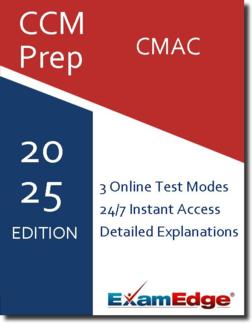CCM CMAC (CMAC) Practice Tests & Test Prep by Exam Edge - Topics
Based on 40 Reviews
- Real Exam Simulation: Timed questions and matching content build comfort for your CCM CMAC test day.
- Instant, 24/7 Access: Web-based CCM Case Management Administrator Certification practice exams with no software needed.
- Clear Explanations: Step-by-step answers and explanations for your CCM exam to strengthen understanding.
- Boosted Confidence: Reduces anxiety and improves test-taking skills to ace your CCM Case Management Administrator Certification (CMAC).

Understanding the exact breakdown of the CCM Case Management Administrator Certification test will help you know what to expect and how to most effectively prepare. The CCM Case Management Administrator Certification has multiple-choice questions The exam will be broken down into the sections below:
| CCM Case Management Administrator Certification Exam Blueprint | ||
|---|---|---|
| Domain Name | % | Number of Questions |
| Identification Of At-Risk Populations | 10% | 10 |
| Assessment Of Clinical System Components | 10% | 10 |
| Development Of Strategies To Manage Populations | 10% | 10 |
| Leadership For Change | 20% | 20 |
| Market Assessment And Strategic Planning | 15% | 15 |
| Program Evaluation Through Outcomes Measurement | 17% | 17 |
| Human Resource Management | 18% | 18 |


